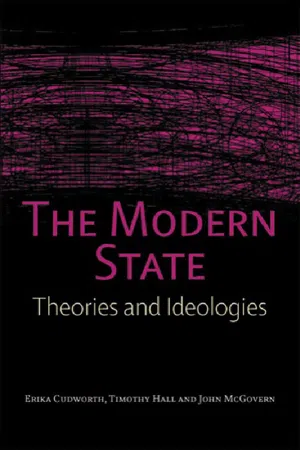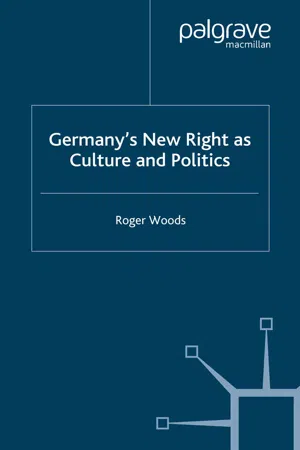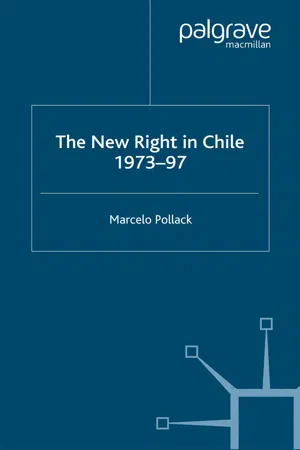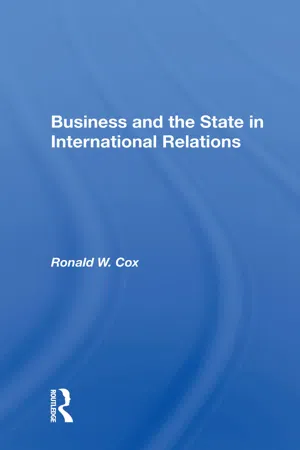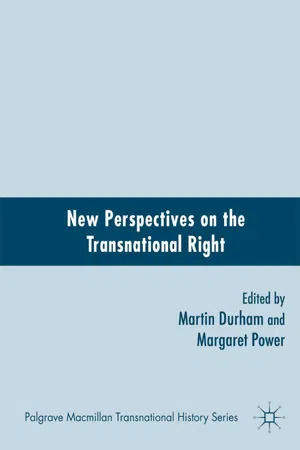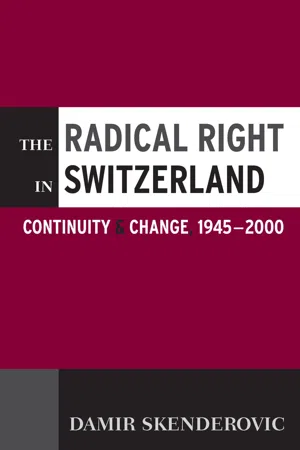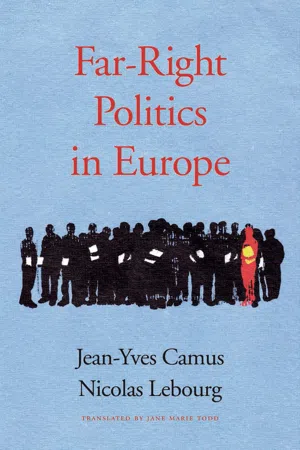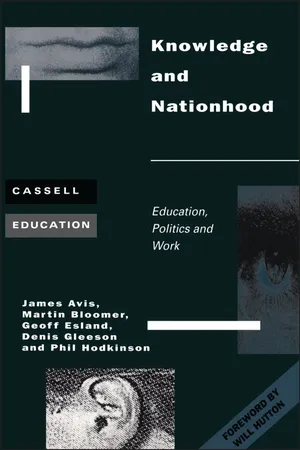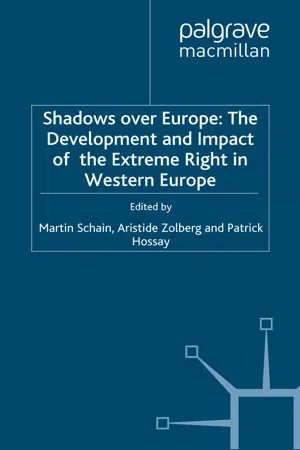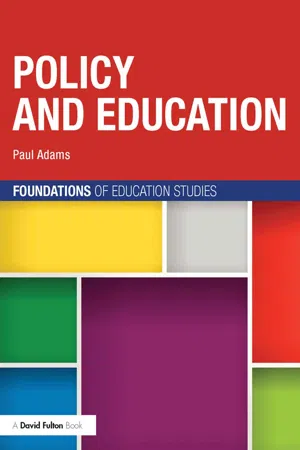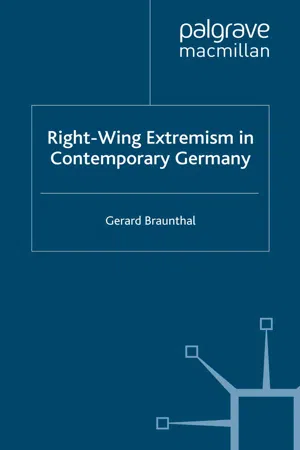Politics & International Relations
New Right
The New Right is a political movement that emerged in the late 20th century, advocating for free-market capitalism, limited government intervention in the economy, and a focus on individual responsibility. It emphasizes the importance of traditional values, national identity, and a strong stance on law and order. The New Right has had a significant influence on conservative politics in various countries.
Written by Perlego with AI-assistance
Related key terms
1 of 5
11 Key excerpts on "New Right"
- eBook - PDF
The Modern State
Theories and Ideologies
- Erika Cudworth, Timothy Hall, John McGovern(Authors)
- 2020(Publication Date)
- EUP(Publisher)
CHAPTER TEN The ‘New’ Right: the Minimal State Erika Cudworth The term ‘New Right’ was associated with the politics of the ‘Thatcher era’ in the United Kingdom and the Conservative governments from 1979 to 1990. In continental Europe, the term ‘neo-liberalism’ is often used to describe the politics of limited gov-ernment and fiscal restraint, and talk of the politics of neo-liberalism abounds in the literature on globalisation. In the United States, however, the association of right-wing politics with certain kinds of Christianity and Cold War rhetoric led to the appellation ‘neo-conservative’ for the kind of Republican Party politics associated with Senator Barry Goldwater in the 1960s and with Ronald Reagan in the 1970s, initially as governor of California, and then as President from 1981 to 1989 (and subsequent governments, see Chapter 8). Some may consider ‘neo-liberalism’ or ‘neo-conservatism’ more con-temporary, but I find ‘New Right’ to be a more accurate descriptor of a distinctive politics that brings together two seemingly incongru-ous positions: a paternalistic support for state intervention; and a commitment to the free market strongly influenced by classical liberal economics. Both critics and proponents consider that there is a cogent body of theory behind the politics of fiscal restraint, limited government and the restoration of authority. Yet the name given to this politics varies both regionally and when the national or interna-tional context is considered. This chapter begins by discussing the emergence of the New Right as a critique of the politics of liberal democratic states in the 240 1960s and 1970s. The development of New Right theory is linked to right-wing anarchism, but it is most usually seen as either a form of conservatism or a form of liberalism. - eBook - PDF
- R. Woods(Author)
- 2007(Publication Date)
- Palgrave Macmillan(Publisher)
1 What is the New Right? Definitions and their uses There is little agreement among observers or representatives of the New Right about what it is. This lack of agreement is partly due to the varying motives of writers on the subject, but it is partly also due to the tensions and ambiguities within the New Right itself. Surveying the definitions of the New Right that have been advanced in recent years and reconsidering the nature and the boundaries of the New Right will help to define the critic’s task. Defining the New Right in terms of its general beliefs sheds light on the movement, but this approach also illustrates a problem. The New Right in Germany is frequently defined as an anti-democratic movement 1 dating back to the late sixties or early seventies and variously referred to as the ‘Young Right’, ‘young conservatism’ or ‘neo-conservatism’. 2 For this reason it has attracted the attention of the Federal Office for the Protection of the Constitution which defined the New Right in the mid-nineties as an ‘intellectual current or ideology that looks to the ideas of the Conservative Revolution and seeks to limit or abolish completely the principles of the free democratic basic order’. 3 Political scientists rightly home in on its rejection of universalism, pluralism, liberalism, parliamentarianism, equality, and multi-culturalism, on its ranking of the collective above the individual, on its wish to see a strong state and a strong leader instead of political decision-making through negotiation and compromise. Many observers define the New Right by pointing to its rejection of the French Revolution and the associated principles 7 of freedom, equality and fraternity. 4 In their place the New Right seeks to establish a ‘Volksgemeinschaft’ (community of the people), based on a supposed natural inequality of races and on the rule of an elite. 5 The New Right is also said to reject neo-Nazism and racism but is committed to the related concept of ethnopluralism. - eBook - PDF
- M. Pollack(Author)
- 1999(Publication Date)
- Palgrave Macmillan(Publisher)
Any such schema was unacceptable to the traditional right because it would claim to provide a science of society which could be used to redesign the world. THE EMERGENCE OF THE New Right The New Right is an ambiguous and complex political term. Several interpretations have evolved, none of which is erroneous, although their relevance to the Chilean case is doubtful. The term ‘New Right’ was first coined in the 1960s for the extreme right-wing French Groupement de Récherche et d’Études pour la Civilisation Européene (GRECE), but its impact has far wider implications. Specifically, it has been used to describe both the American populist neo-conserva- tives of the 1970s and 1980s and the French Nouvelle Droite, whose inspiration lies with the far-right cultural theorist, Alain de Benoist. In the context of the present study both of the above interpretations are irrelevant. A more general definition is needed to incorporate those previously marginal ideologies and movements which devel- oped in Chile in the 1960s and 1970s. The term ‘New Right’ is best expressed by Stephen Davies, who describes it as a ‘portmanteau label for the many anti-socialist move- ments in politics and philosophy which have become poignant in recent years’. 14 The New Right is simply the entire collection of neo-conserva- tive and neo-liberal movements which have developed since the 1960s. This categorization is more meaningful in so far as the varied compo- nents of the New Right have cooperated on the basis of a shared, albeit largely negative, agenda based only on their general hostility to social- ism. This single factor has brought together a diverse set of intellectu- als, ranging from libertarian thinkers to defenders of reactionary values. Another linking strand is that the ideas of the New Right embody a critique of both left-wing philosophies and the experience of left- wing governments. 15 - Ronald W Cox(Author)
- 2019(Publication Date)
- Routledge(Publisher)
The New Right appeared in the mid-1970s as the section of the right wing that is distinct from both traditional conservatism and more extreme, far-right groupings. The emergence of the New Right was to some extent consciously encouraged (not to mention actively funded) by conservative business leaders, and to some extent it was an independent development that nevertheless complemented the aims of the newly-emerging elite industrial coalition.The New Right is important to study when analyzing the emergence of the second cold war since it, more than any other section of the right wing, served as a catalyst in connecting right-wing business interests and hard-line anticommunist sentiments with the electoral strategies and policy goals of the Republican Party. The New Right (in its secular-political, religious, and intellectual manifestations) was a central political actor in justifying the revival of military intervention as a legitimate instrument of government policy.While much has been written on the New Right's domestic agenda, there has been a relative paucity of attention to its active engagement in the evolving political debate around foreign and military issues. For example, Paul Weyrich's Committee for the Survival of a Free Congress (now known as the Free Congress Foundation) organized regular luncheon meetings on foreign policy issues with congressmen and their aides to brief them on defense and foreign policy topics. In 1982, the Free Congress and Education Foundation created a committee to support the Contras.The Heritage Foundation, a New Right think tank with offices on Capitol Hill, presented Reagan with a blueprint program for "raising defense spending by 35 billion dollars, unleashing the CIA, using food as a foreign policy weapon, and restoring Congressional internal security committees."30- eBook - PDF
- M. Durham, Margaret Power, M. Durham, Margaret Power(Authors)
- 2016(Publication Date)
- Palgrave Macmillan(Publisher)
In the United States, however, the New Right emerged as a manifestation of an older conservatism. If free-market advocates sometimes defined themselves as liberals in the United States, we have the problem of what is meant by the Right in a different form. In the 1950s, American conservatism brought together those who believed that the expansion of government rep- resented a threat to freedom (libertarians), those who feared that soci- ety was increasingly unsympathetic to the rightful claim of authority (traditionalists), and those who had been drawn to conservatism by their dread of Communism. Whether all those described as being on the right are best characterized in that way is not an easy question to resolve. We need, however, a way of examining the rise of a poli- tics that promoted market forces and which has been described both as conservative and neo-liberal. This has been a diverse force that has not always been united or willing to describe itself as right wing. But those it identifies as its enemies help us locate it, just as does its defense of liberty over equality. With some hesitation, then, the term we will use to describe it is right wing. In looking first at the free-market right, we need to go back before the Second World War to the 1930s, when such figures as Franklin Delano Roosevelt, Lloyd George, and—above all, John Maynard Keynes—both championed opposition to Socialism and Transnational Conservatism 135 supported state intervention. Resistance to their policies came from a beleaguered group of free-market economists in Europe and the United States who, in the summer of 1938, organized an interna- tional conference in Paris that sought to revitalize liberalism as “the only alternative . . . to totalitarianism.” But the world war that soon followed made it impossible to organize against the dangers they saw, and it was not until after the defeat of the Nazis that they could meet again. - eBook - PDF
The Radical Right in Switzerland
Continuity and Change, 1945-2000
- Damir Skenderovic(Author)
- 2009(Publication Date)
- Berghahn Books(Publisher)
Since some factions of the New Right a Ĵ empt to reach a certain level of ideological sophistica-tion, they concentrate on the world of intellectuals and culture and de-velop arguments wrapped in scholarly language in order to in fl uence public discourse. Others display their ideological and political objec-tives more openly and simply choose propagandistic means of action in order to move public debates to the right. In their role as initiators and suppliers of ideas and intellectual con-cepts, the followers of the New Right produce a gradual rather than an immediate political impact. Their aim is to shape, in the long run, a whole variety of the political, cultural and social issues that are dis-cussed in politics and society. However, some followers of the New Right are also involved with political parties and in everyday politics. They serve as advisers to political leaders, contribute articles to party papers, or even run for public o ffi ces. Overall, arguments and policy proposals put forward by radical right-wing populist parties are in-spired, more o Ğ en than not, by ideas and concepts developed by the New Right. 120 On the other hand, one section of New Right intellectuals associate themselves with the extreme right, particularly its negationist faction, and thereby engage in its propaganda campaigns, a Ĵ end rallies and meetings, or supply its periodicals with articles and essays. Since a large part of the literature on the New Right draws from single-country research, we are still missing a general, cross-nationally applicable de fi nition of the ‘New Right’. A common distinction is made 34 | The Radical Right in Switzerland between, on the one hand, the Anglo-Saxon New Right, based mainly in the United States and Great Britain, and on the other, the continental European New Right with its strongholds in France and Germany and its o ff shoots in most other European countries. - eBook - PDF
- Jean-Yves Camus, Nicolas Lebourg, Jane Marie Todd(Authors)
- 2017(Publication Date)
- Belknap Press(Publisher)
In the United States, Australia, and Great Britain, the term “New Right,” popularized by the American adver-tising executive Richard Viguerie, 2 among others, later came to des-ignate a broader movement, reactionary and moralistic, proponent of a state reduced to its regalian functions. Its leading figures were Ronald Reagan and Margaret Thatcher. 3 But that right, which can be identified with the right wing of the Republican Party in the United States, with the British Tories, or, in another variant, with the New Zealand First Party, has very little to do with the New Right that grew out of GRECE or its friends abroad. In fact, their philoso-phies are diametrically opposed. The ultimate paradox is that both New Right movements employ the expression “conservative revolution,” but only the European New Rightists use it to indicate a continuity with the thought of Moeller van den Bruck and his associates, as presented by Armin Mohler in 1948. The New Right in All Its Diversity 123 To add to the complexity of the problem, in French, “Nouvelle Droite” is a term invented by the press during the major controversy surrounding the ideas of GRECE, which began with the publication of an article by Thierry Pfister in Le Monde on June 22, 1979. GRECE then adopted the term as either a stopgap measure, a matter of con-venience, or out of defiance, aware that it constituted a strong iden-tifier but not being completely comfortable with it. The intellectual personalities and groups that laid claim to that New Right did not by any means form a coherent whole, rather a network based on affini-ties and similarities. The preeminence of the original French nucleus seems to have declined over time. The most recent synthesis of its doctrine dates back some fifteen years and is hardly consistent with the ideas currently defended by most of the groups. - eBook - PDF
- Denis Glesson(Author)
- 1996(Publication Date)
- Continuum(Publisher)
As Stuart Hall puts it, when the era of nation-states in globalisation begins to decline, one can see a regression to a very defensive and highly dangerous form of national identity which is driven by a very aggressive form of racism. (Hall, 1991, p. 26) The paradox of a government simultaneously wishing to experience the economic opportunities of a deregulated global economy while retaining control over its powers of decision-making in fundamental areas of social policy is seen in a particularly acute form in the UK of the 1980s and 1990s. A central feature of the New Right regime has been its determination to exert increasing control over cultural institutions and at the same time to prescribe for them a set of values approved by itself. Where direct inter-vention does not take place, there are alternative controls which include exercising jurisdiction over their funding and markets and their organizational and management systems. As Gray (1994b) has argued, a central feature of the New Right - at least in its more recent manifestations - has been the restructuring of the state apparatus in order to secure the dominance of its own position. In the course of doing so it has severely restricted the democratic opportunities within British culture. The educational policies of Conservative governments have in the main been founded on a partial and restricted concept of economic change and a regressive form of national-ism. Allied to other elements of the New Right agenda -notably the determination to ignore professional contribution to debates in education and the introduction of a market-ized and managerial culture in education -these features of the post-1979 settlement have produced both instability within educational institutions, and an education and training system which no longer has a clear relationship with employment and economic change. - eBook - PDF
Shadows Over Europe
The Development and Impact of the Extreme Right in Western Europe
- M. Schain, A. Zolberg, P. Hossay, M. Schain, A. Zolberg, P. Hossay(Authors)
- 2002(Publication Date)
- Palgrave Macmillan(Publisher)
On the other hand, radical right has been used to designate those movements and groups that find their ideological imprinting in a coun- terrevolutionary anti-modern tradition of thought and that boast and even adopt violent means up to terrorist actions (Ferraresi 1996). Following this tradition, radical right would tap a very limited space of contemporary right wing extremism. The use of the term New Right has raised even more confusion. New Right indicates the neoconservatist agenda, a cultural movement sustained by some think tanks and publishing enterprises that originated from and operate within the conservative political space. The French version of the term, Nouvelle Droite, is even more specific as it connotes a tiny group of brilliant intellectuals, based originally in France with Alain de Benoist at their head. The Nouvelle Droite is similar to the New Right for the reference to the cultural domain, but it does not share anything in terms of values: To summarize, the Nouvelle Droite is anti-liberal and anti- socialist, while the New Right is anti-socialist but pro-liberal. A term that has found wide audience in the more recent literature is “populism.” Hans-Georg Betz (1993) speaks of the “populist extreme right.” Several authors have offered varying definitions of populism; most highlight the highly charismatic dependence on “common sense” and a rejection of existing political institutions (see Betz 1993, Taggart 1993, Pfahl-Traugher 1993, and Kitschelt 1995). 22 ● Piero Ignazi A wide range of properties, such as the organizational structure, lead- ership style, or electorate profile, have been suggested to characterize this kind of party. None of these, however, seems useful: no organiza- tional structure nowadays pertains to a specific type of party; the classi- cal typology by Duverger (1951), with the “militia” type linked to the fascist parties, no longer holds. No leadership style seems exclusive of the extreme right parties. - eBook - PDF
- Paul Adams(Author)
- 2014(Publication Date)
- Routledge(Publisher)
This means that that policy cannot be read off simply as ‘New Right’; care should be taken to consider its leanings. It should be noted, then, that the New Right is more of an amalgam of ideologies rather than a coherent political ideol-ogy of its own; neoliberalism and neoconservatism emphasise different things. Despite inherent contradictions in the two ideologies, neoconservatism and neoliberalism became welcome bedfellows in the New Right thinking of post-1979 Conservative govern-ments. Held together by a shared distrust of socialist principles, a mistrust of professions and professional groups and strong leadership in Margaret Thatcher, the New Right agenda, as an amalgam of neoconservative and neoliberal thinking, sought to enact policies that, at the same time, pandered to free market principles whilst being somewhat traditionalist in orientation. A good educational example of this contradictory thinking can be seen in the drive to both provide parents with information about school performance so that they might choose schools for their children, whilst at the same time mandating what it is that schools are required to teach through the National Curriculum. The former demonstrates key neoliberal thinking in that pitting school against school supposedly engenders increased performance and efficiency within a meritocratic regime. The latter holds up certain subjects deemed important in the education of the nation’s children, some of which, at least, will be so classified due to their cultural heritage and traditional place on the curriculum. However, such state control of the curriculum was seen as necessary to engender free market ideals; give parents a level curricu-lum playing field and it will be easier for them to make their choices. - eBook - PDF
- G. Braunthal(Author)
- 2009(Publication Date)
- Palgrave Macmillan(Publisher)
They bemoan the lack of full German sovereignty, some of which has been lost to the European Union. They opt for a strong authoritarian state, headed by a president with full powers and with the authority to restrict political parties. Voters would need to approve such a radical proposal by a national plebiscite. 5 The author Michael Venner argues cogently that the New Right, which he labels “conservative-revolutionary,” seeks to serve as the conduit between, on the one side, ultra-conservatives in the mainstream democratic parties and, on the other side, right-extremist forces. As these two camps on the New Right perimeter are not rigid, CDU/CSU and FDP ultra-conservatives, on the The New Right 141 one hand, and Republican, DVU, and NPD leaders, on the other, can have an influence on the New Right or can support its emphasis on the nation and nationalism. Thus, for example, the ultra-conservatives, aware that they concur with some of the New Right doctrines, will not automatically label the New Right positions as anti-democratic. 6 In unified Germany, most New Right disciples have distanced themselves tactically from the right-extremist parties, although the views of both camps rest on the anti-democratic “conservative revolution” ideas propagated dur- ing the Weimar era and, for some of them, on Nazi and anti-Semitic concepts. The New Rightists call on the German ruling elite to sever the country’s close ties to the culturally decadent United States and the West. These countries stand for an unacceptable universal egalitarianism that has spread to other countries via Christianity, liberalism, or Marxism. Egalitarianism, which provides free rein for consumerism, capitalism, and big business, needs to be supplanted by a return to pre-Christian times in a neo-pagan setting. Thus, the New Rightists call on the German government to pursue a pol- icy of “ethnopluralism,” which means the separation of ethnic groups and a denial of multiculturalism.
Index pages curate the most relevant extracts from our library of academic textbooks. They’ve been created using an in-house natural language model (NLM), each adding context and meaning to key research topics.
